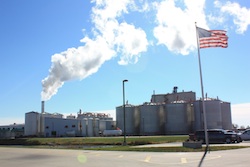 The theme of the 20th National Ethanol Conference was “Going Global,” and the title panel featured five international experts to discuss building ethanol demand in new markets.
The theme of the 20th National Ethanol Conference was “Going Global,” and the title panel featured five international experts to discuss building ethanol demand in new markets.
Moderated by Renewable Fuels Association (RFA) general counsel Ed Hubbard, the panel included Pedro Paranhos of Eco-Energy; Lakeview Energy CEO Jim Galvin; Henrique Pacini of United Nations Conference on Trade and Development (UNCTAD); Mike Dwyer with the USDA’s Foreign Agricultural Service; and Robert Wright with ePure.
Hubbard started off the conversation, pointing out that while the U.S. ethanol industry hit record-breaking levels of ethanol exports to the world – 836 million gallons in 2014 – there’s still room for growth.
“As long as U.S. made ethanol provides a valuable, cheaper and cleaner alternative to petroleum-based gasoline, it will continue to be sought all over the globe. This panel’s goal is to help you identify some opportunities, new and expanded, to address some of the challenges we face as we move forward,” Hubbard said.
Paranhos echoed those sentiments, as he broke down how Brazil has seen its overall ethanol market grow over the last 10 years but has plateaued in the last few. Part of that is some of the same issues U.S. ethanol producers are facing: economics and regulatory, in America’s case, the blend wall. The panel talked about how export markets are helped the most by mandates, which help fuel growth of ethanol. Presenters pointed out that producers need to consider sustainability and environmental factors to meet certain countries’ and regions’ requirements to get into those markets, which also, in turn, return better profits for ethanol plants.
Dwyer told those attending that ethanol has made tremendous global gains over the past few years – impressive when you consider the green fuel had to overcome the “food-versus-fuel” debate and a 54-cent-per-gallon tax on ethanol exports.
“In 2008, when I took over this job, if I had told you that the U.S. would become the world’s largest exporter of ethanol, you would have thought I was drinking that ethanol,” he said, pointing out how while gasoline consumption has dropped in the U.S., it’s growing worldwide, making American ethanol competitive on the global market. “A lot has happened in five years.”
The panel members said, even when you consider where ethanol has been and the obstacles ahead, there still is great potential for growth worldwide.
Listen to the panel’s complete remarks here: NEC 15 Going Global Panel
2015 National Ethanol Conference Photo Album
 Our latest ZimmPoll asked the question, “Which crop insurance option will you be choosing?”
Our latest ZimmPoll asked the question, “Which crop insurance option will you be choosing?”









